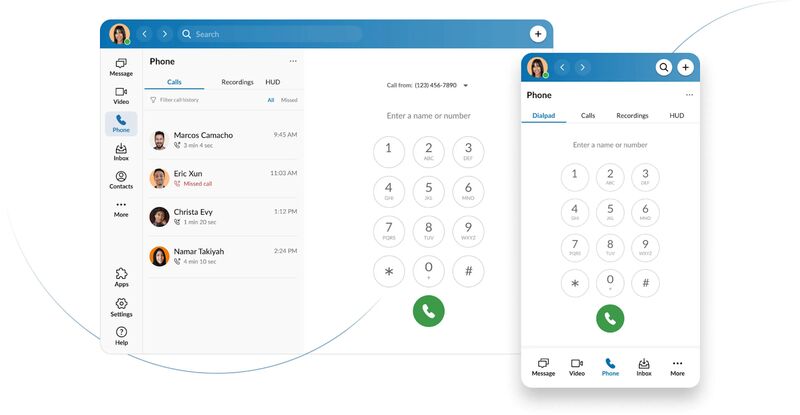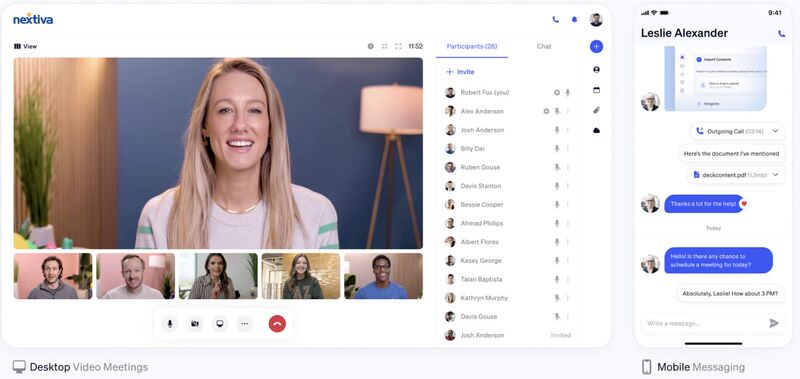Phone echoing occurs when you hear repeating voices and sounds while on a phone or video call. Echoes can be distracting, making it difficult to carry on a conversation. The primary causes include faulty hardware, weak signal, limited bandwidth, and packet loss. This guide offers quick solutions and preventative measures on how to stop echo on phone calls, such as adjusting device volume, ensuring a stable internet connection, and updating your hardware.
1. Speakerphone Reverb
Speakerphone reverb, also known as acoustic feedback, is a primary cause of echo on the phone. This is common when the speakerphone mode is activated during phone or video calls with high-volume settings. As the caller’s voice projects through the recipient’s speaker, the recipient’s microphone picks up this sound, transmitting it back to the caller’s phone as an echo.
How to Fix It
The best way to eliminate speakerphone reverb is to turn off the speakerphone mode. If this isn’t possible, reduce the volume of both the speaker and microphone on your device and adjust the settings. If you’re using an external microphone, create a distance of at least eight inches between the microphone and the speaker. To avoid being tied up with wires, use Bluetooth earphones or a headset.

Wearing headphones prevents the microphone from picking up sound from the speaker.
Investing in noise-canceling equipment helps minimize loud background sounds and brings high-quality audio for conference calls. You can also filter your meeting room by adding foam or furniture, such as carpets and curtains, to absorb sound waves.
2. Limited Bandwidth
Limited internet bandwidth reduces upload and download speeds, causing echo-inducing lag. This occurs when everyone in the office is engaged in bandwidth-intensive activities simultaneously, such as hosting large video conferences, uploading or downloading large files, and streaming videos.

Large video conferences consume significant bandwidth, potentially leading to phone echoing.
How to Fix It
Consult your internet service provider to see if there’s a need to upgrade your bandwidth based on your usage requirements. Ideally, for a small team, you want at least 10 megabits per second (Mbps) of download and 1Mbps of upload speed per user.
Check your internet speed by running our free network speed test. Speed tests determine whether your internet service can support your bandwidth needs. Otherwise, consider switching your voice-over-internet protocol (VoIP) provider if the internet speed is not the problem. Evaluate your phone service based on your plan’s features, price, and call quality.
When it comes to high-definition voice quality, we recommend RingCentral. It uses well-regarded codecs to allow audio data to travel to the internet efficiently and offers a suite of communication features to elevate team and customer interactions. Visit our RingCentral review to get a comprehensive look at its pricing and functionality.

RingCentral provides a rich call experience on both desktop and mobile. (Source: RingCentral)
3. Poor Network Signal
Weak and inconsistent signals on your Wi-Fi or cellular connection happen for several reasons, such as bad weather, infrastructure, or terrain interference. This leads to phone echoing, lag, and other call quality issues, especially if you’re connected via mobile or public networks in coffee shops or restaurants.
VoIP phone calls rely on the internet and require about 0.3Mbps of bandwidth per device. Failure to meet this requirement leads to packet loss due to voice transmission error, causing your audio to echo.
How to Fix It
Check the signal and device indicators to see if you have a strong Wi-Fi signal or mobile data connectivity. If you’re surrounded by thick walls, move closer to the VoIP router for a better connection, or install range extenders to enhance the range of your wireless signal. If you’re on mobile data, relocate to an area with better reception.
Consider resetting your phone or router to clear any connectivity issues. Upgrading to Wi-Fi 6 or using a 5G connection on your phone may also significantly improve your internet connection. If problems persist, contact your service provider for further assistance and troubleshooting.
4. Electromagnetic Interference
Placing a VoIP phone near other electronic gadgets contributes to echoing phone calls. This can be any type of electromagnetic device, such as a computer monitor, power strip, smart appliance, or mobile phone.
When making a VoIP call near these gadgets, the device’s signal might capture the electromagnetic waves they emit. This interaction causes signal interference, resulting in echoes due to the presence of strong electrical fields.

Placing your devices close together creates electromagnetic waves, resulting in phone echoing.
How to Fix It
Strategize your workstation setup by ensuring adequate distance between electronic devices, particularly those placed too close to each other. If your team is joining a conference call in the same room, have the participants join the meeting from their desks or use a room device, which is an integrated video meeting equipment built for conference rooms.
Devices have a large electrical field. Hence, it’s best to remember this when deciding on the placement of your gadgets and where to set up your conferencing devices, such as speakers and microphones.
5. Defective or Outdated Hardware
Hardware issues or incompatible devices interfere with call quality and system performance. These include poor wiring, damaged cabling, low-quality splitters, and faulty equipment, such as headsets, microphones, and routers. When left unchecked, defective hardware can cause visual and audio disruptions, including phone echoing.
How to Fix It
Begin by checking your devices for any physical damage, such as broken components, loose connections, or twisted cables. If there’s none, the next step is to isolate different hardware and devices. You can try plugging in a different cable or adapter or using different headsets or microphones.
Repair or replace the defective hardware with more reliable alternatives to ensure quality performance and long-term use. Additionally, make sure your equipment is compatible with your VoIP phone system, as it ensures that audio signals are transmitted correctly, reducing the likelihood of phone echoing.
Nextiva publishes lists of supported routers and phones for easy reference. This provider offers a conversation suite that integrates phone, video, and chat, ensuring seamless collaboration between customers and teams. In our Nextiva review, we give a detailed overview of its subscription fees and core functionalities.

Nextiva provides a single workspace for business communications. (Source: Nextiva)
6. Jitter or Packet Loss
Jitter refers to the delay in sending data packets over your network connection, often due to network congestion, route changes, or timing drift. High jitter levels result in phone echoing, which negatively impacts your communication experience.
Packet loss, on the other hand, occurs when data packets fail to arrive at a destination after being transmitted across a network. Sometimes, data packets take different routes, especially if the hardware isn’t performing optimally. Packets are dropped by congested network routers or disregarded as jitter buffers, leading to call quality issues and a delayed echo.
How to Fix It
When experiencing high levels of network jitter, use a jitter buffer, a shared data area that temporarily stores audio data during a VoIP call before being sent to the recipient. It improves the quality of voice calls by reducing jitter, which can cause audio delays and sound distortion.
Our guide on how to fix packet loss offers detailed steps on troubleshooting packet loss issues and ensuring smoother network flow. We provide helpful tips, such as investing in a powerful router, upgrading your internet services plan, or using wired connections instead of Wi-Fi.
Tips on How to Prevent Phone Echoing
Phone echoing negatively affects how you coordinate with team members, partners, and clients. Frustrated call parties struggling to understand what you are saying can damage their perception of your company. Minimize phone echo and consider the following preventative measures:
- Invest in quality equipment: Choose network equipment, phones, and communication devices like VoIP headsets, speakers, and microphones that are compatible with your phone system. Read customer and expert reviews to determine their feature specifications and how well these products perform.
- Optimize network settings: Routinely check your network configurations and settings, including the quality of service protocols, to ensure optimal call quality.
- Regularly update software: Optimize network performance by regularly updating your system. Updating your software with the latest bug fixes addresses known issues that may be slowing down your system.
- Be aware of your surroundings: Be mindful of your location and immediate environment, as it can affect the quality of your calls. When possible, use your phone in a quiet area with a strong signal to reduce the chances of echo.
Frequently Asked Questions (FAQs)
Not necessarily. Phone echoes occur for various reasons, including unstable internet and defective hardware. For extra measure, choose a reliable business communications provider with robust security and data privacy features, including end-to-end encryption.
Wi-Fi calling doesn’t inherently cause phone echo, but it can be influenced by factors such as network issues, bandwidth congestion, and hardware quality. To avoid echoes when making calls via Wi-Fi, troubleshoot network issues and use high-quality devices.
Addressing echoes during video calls follows similar strategies used to prevent echoing in phone calls. These include turning the volume down, wearing noise-canceling headphones, and muting your microphone when you aren’t speaking.
Bottom Line
Phone echoes adversely affect your business reputation, customer satisfaction, and team communication. Primary causes vary from poor network signal to faulty hardware. To ensure quality conversations, follow our guide to learn how to stop echo on phone calls. Dealing with these issues early on can prevent further disruptions in your business and customer relationships.